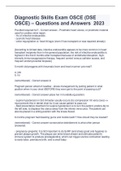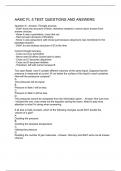Diagnostic Skills Exam OSCE (DSE OSCE) – Questions and Answers 2023 Pre-Med required for? - Correct answer -- Prosthetic heart valves, or prosthetic material used for cardiac valve repair. - Hx of infective endocarditis - cyonotic heart disease - valve regurgitation w. heart thingys (even if has transplant or was repaire d already) [According to limited data, infective endocarditis appears to be more common in heart transplant recipients than in the general population; the risk of infective endocarditis is highest in the first 6 months after transplant because of endothe lial disruption, high -
intensity immunosuppressive therapy, frequent central venous catheter access, and frequent endomyocardial biopsies] 5 month old preggers with rheumatic fever and heart murmer: pre med? a. yes b. no (remembered) - Correct answer -b Pregnant person afraid of needles - stress management by putting patient in what position when in your chair (BEFORE they even get to the point of passing out)? (remembered) - Correct answer -place her in trundelburg position. - supine hypotension in 3r d trimester usually occurs (bc compression Inf vena cava) => must prevent this in dental chair bc it can cause patient to pass out. - Best preventative treatment for supine hypotension is to turn the patient, prefera -bly to the left side, to displace the uterus away from the inferior vena cava. The patient can also be placed in a sitting position with the knees flexed. 6 months pregnant had bleeding gums and mobile teeth? How should they be treated? (remembered) - Correct answer -conservative debridement is what other person answered. - pregnancy gingivitis: It is SO important to do ScRP (and stress good oral hygeine) to prevent plaque growth. The plaque can enter blood stream and stimuate patient's immune system to produce prostaglandins, which can trig ger uterine contraction leading to early labor, premature birth, and a small baby. Pregnant lady with a diastema in between #8 and #9 with deep probing depth and class 1 mobility on 8 and 9. What is the reason for diastema? (remembered) - Correct answer -chronic perio - increased incidence of periodontal disease during pregnancy => must emphasize good oral hygiene, and remove all their plaque so it doesn't lead to premature birth / small baby. Permanent dentition with tetra cycline staining, when did this happen? (remembered) - Correct answer -Patient ingested tetracycline when they were between 0 and 5 years old • Pentobarbital (Nembutal) • Secobarbital (Seconal) are what kind of drugs? - Correct answer -barbiturates - Both pentobarbital (Nembutal) and secobarbital (Seconal) are used primarily on the evening before the dental appointment. Barbiturates - how should an allergic reaction be treated? (remembered) - Correct answer -Benadryl -> if its a mild -moderate allergy. - When a patient experiences a milder form of anaphylactic reaction, the drug or prepara - tion that caused a reaction is discontinued and the patient is given diphenhydramine (Benadryl), 25 -50 mg/tablet PO q6h for 48 -72 hr. Steroids - whats most importa nt information you need to get from your patient when you find out they are on steroids.. before even thinking about treating them? (remembered) - Correct answer -duration and dosage. - "The rule of twos": Ask whether the patient is currently on steroid s or has been on corticosteroids for 2 weeks or longer within the past 2 years. You must go back 2 years in the history because it can take 2 weeks to 2 years for the adrenal glands to bounce back to normal function. Patients _____ is the most important thing for calculating medication dosage for a child. a. age b. weight c. gender d. height (remembered) - Correct answer -b Biggest concern with down syndrome? he thought Congenital Heart Defects. - Trisomy 21 a re at increased risk of cardiac defects, true. - early onset periodontal disease IS MOST SIGNIFICANT ORAL HEALTH PROBLEM; they have a lower prevalence of dental caries though. Consider prescribing Chlorhexidine or other antimicrobial agents for daily use . - When treating, consider patient's cardiac status and need for premedication (medical consult may be indicated). (remebered) - Correct answer - Patient just had a stroke. What do you need to worry about? (remembered) - Correct answer -if they are on anti-coagulants (blood thinners). - Stroke patients could be on blood thinners, such as aspirin, dipyradamole (Persan - tine), clopidogrol (Plavix), or Coumadin, postrecovery. Prior to major surgery, always consult with the patient's physician to determine whether and when the blood thinner s can be stopped and subsequently restarted. - . Following a CVA that required significant hospitalization, routine dental treatment must be delayed by 6 months. - Routine dental treatment should be delayed by 3 months if the post -CVA recovery was unevent ful and the patient was admitted overnight just for observation. - Avoid epinephrine containing LAs during the first 6 months of dental treatment. Subsequent use of epinephrine depends on the patient's prognosis. Epinephrine containing LAs can be used star ting 1 year after the stroke, when the patient demonstrates progressive improvement of the CVA and absence of TIAs. What is the difference in anaphylaxis vs syncope? (remembered) - Correct answer -anaphylaxis has wheezing and bronchoconstriction. - anaphyalxis: intense itching, hives, flushing over the face and chest. Rhinitis, conjunctivitis, nausea, vomiting, abdominal cramps, and perspiration. Palpitation, tachycardia, sub - sternal tightness, coughing, wheezing, and dyspnea. BP drops rapidly and loss of consciousness or cardiac arrest can occur in severe cases. - syncope: fright and flight response. Anxiety, tachycardia, perspiration, light -
headedness, and blurred vision are commonly experienced. The Enzyme Linked Immune Absorbent Assay (ELISA) Test - a negative response for a person who had needle stick means what? a. the patient definitely has an HIV infection b. the patient has antibodies to HIV -1 present c. the patient definitely does not have an HIV infection d. the patient has no antibodies to HIV -1 present. (remembered) - Correct answer -patient had no Abs present was answer. - The ELISA Test is "reactive" when it detects antibodies to HIV -1. Once positive, the blood is tested again to confirm that indeed the ELISA Test is positive. - Western Blot Test is more specific test. It determines size of antigens in the test kit binding to the antibodies. Blood showing a positive ELISA is subjected to the Western Blot Test. Thus, the Western Blot Test is a confirmatory testing for HIV infection. A positive Western Blot Test confirms that the patient has the HIV infection. 14 y.o. patient with inflamed gingiva. Given normal ranges and then the patient's abnormal numbers for RBC, (High) WBC, platelets, sore lymph nodes, and painful gums. What is wr ong? (remembered) - Correct answer -Leukemia because high WBC, sore lymph nodes, and painful gums - note: WBC can be high or low for leukemia. - Gingival hypertrophy is common with leukemia. Arm rash - what drug caused it? (remembered) - Correct answer -penicillin allergy is answer Cyclosporine - side effect you need to know? - Correct answer -gingival hyperplasia (cyclosporine is an Immunodepressant used in transplant patients. )





